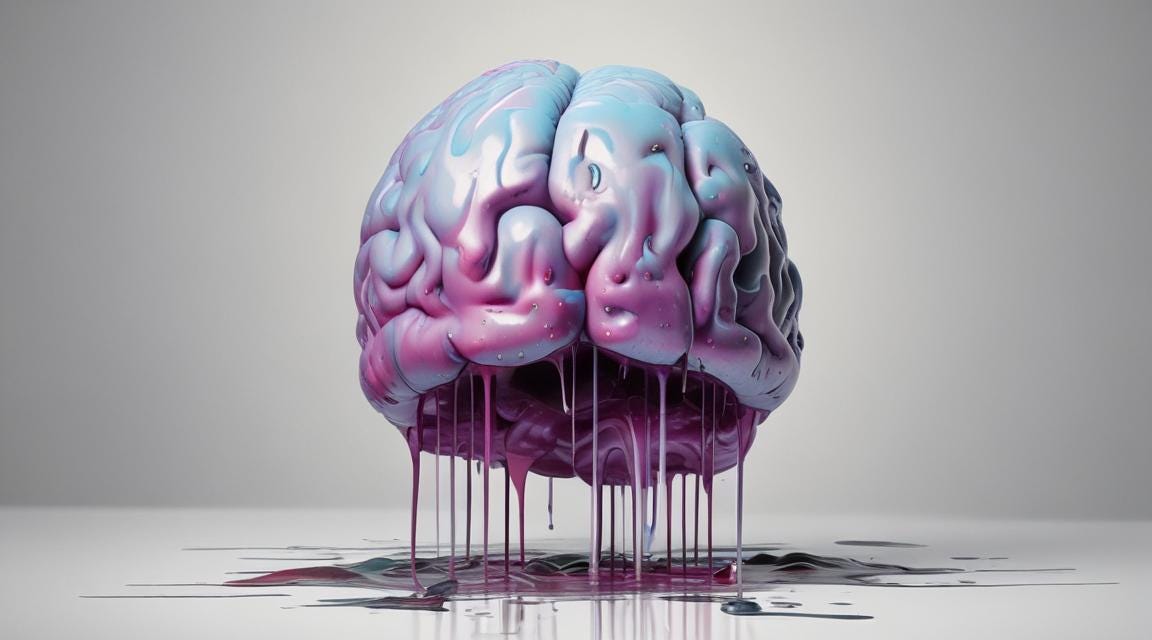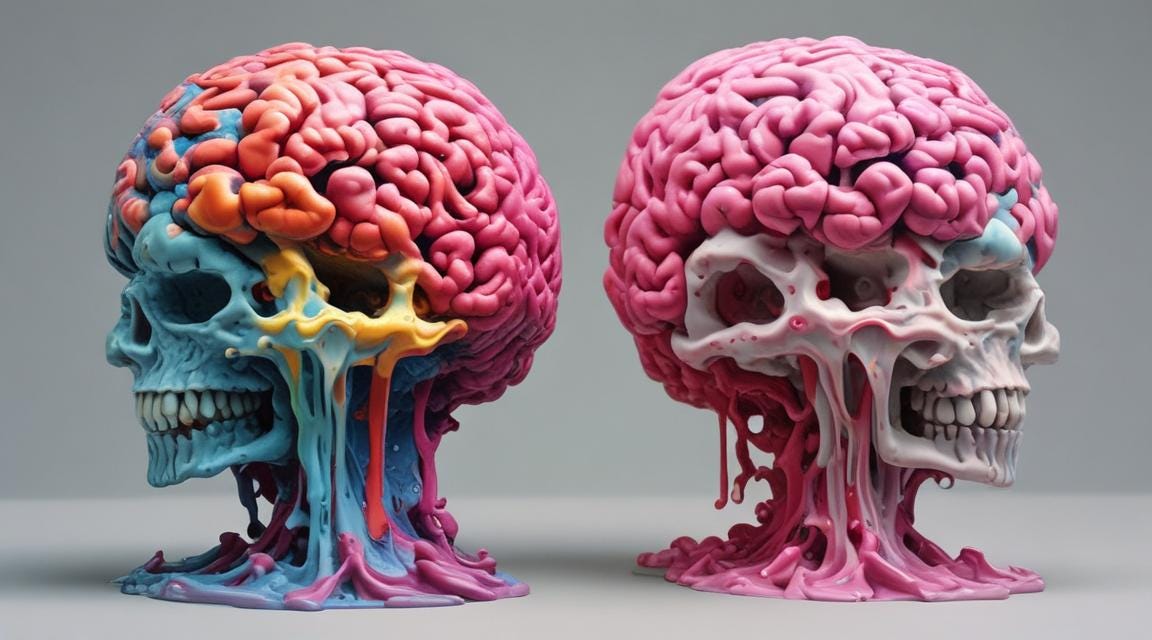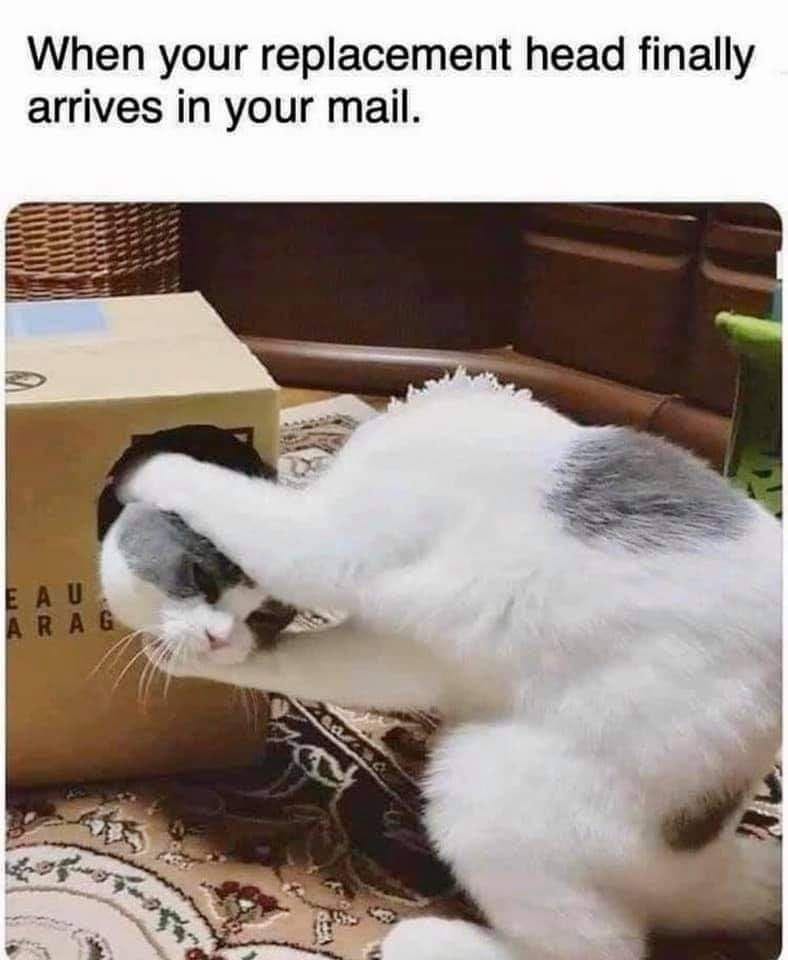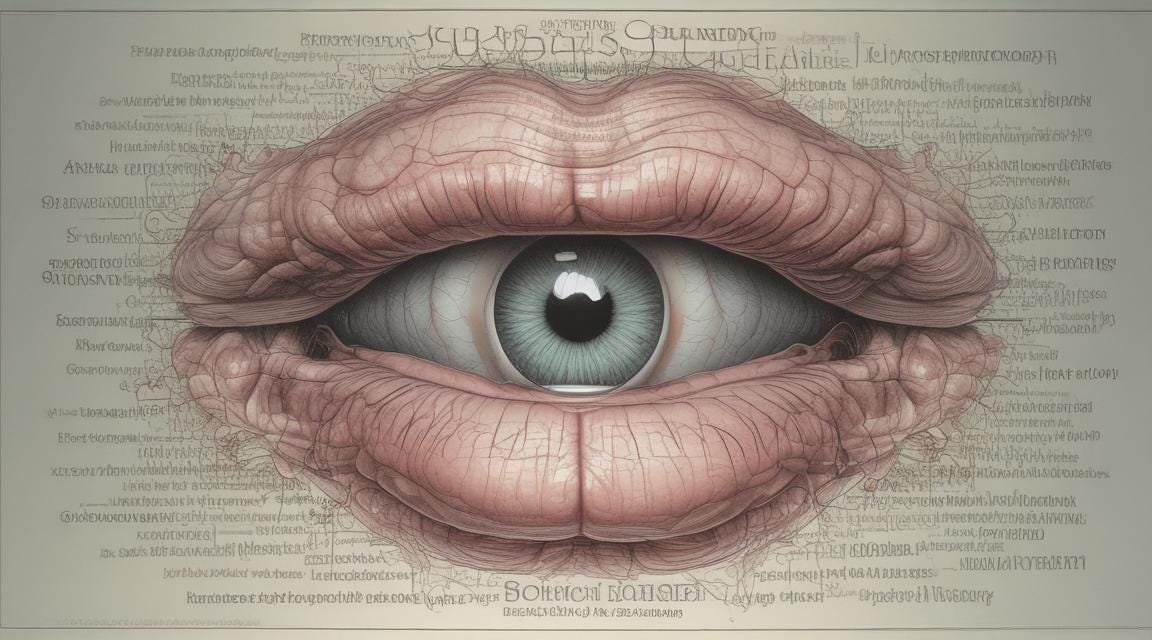THE SCROLL: How To Integrate New Or Conflicting Information Without Melting Your Brain
"If our experience is destroyed, our behavior will be destructive." - R.D. Laing
The Starfire Codes produces an audience-supported publication with a stellar podcast, consciousness-expanding daily spiritual content, and well-researched articles on forbidden but crucial topics.
If you love our work, please join our constellation of curious minds and venture into forbidden realms of knowledge.
Hit that like button!
Share with fellow seekers!
If you haven’t yet, please become a Paid Subscriber to support the cosmic quest for truth!
This is what we do full time. Thank you for all of the ways you support The Starfire Codes! It means the universe to us. 🌟
I wrote the following passage in response to Nathalie Martinek PhD’s having tagged me in a post regarding her article It’s the end of the world as we know it at her publication Hacking Narcissism. If you’re not following her stack yet, please do.
Nathalie asked me to chime in with my thoughts in response to what she had written there regarding both the adaptive and maladaptive ways in which people attempt to integrate major paradigm shifts in thought, so please read her article in her own words above for appropriate context before continuing on.
I will show you our conversation and relevant related conversations, but I am also going to go back into my own vault to show you what was happening at the time, some of what my group was thinking and feeling, some of our insights, and how we chose to navigate and overcome pitfalls and landmines in these areas.
Please note that I will NOT be calling attention to any of them by name because they observe strict OPSEC to preserve their identities, but I would like to take a moment to express my gratitude to them for having taken this journey with me. You know who you are. And thanks to all of you who participated in this conversation!
In response to Nathalie’s request for my thoughts on her wonderful piece, I responded with the following:
This likely wasn’t the reason why you tagged me, @Nathalie Martinek PhD, but I will speak openly from my own experience. I hope you find this valuable.
In one of the groups I was in, which I partially discuss in the following link, I was doing a lot of work with people who were going through this breaking down and rebuilding existential thought paradigm in a very, very short amount of time.
Full immersion, band aid completely ripped off.
What we found was that rapid exposure to the thoughts and ideas that trigger a massive truth related paradigm shift - in our case, this would have been exposure to disclosure - can cause all of the states that you’re describing.
The sudden realization that everything you were ever taught was wrong can be completely earth shattering.
And to survive that, you have to have the presence of mind to be able to sort that through and remain mentally, psychically and emotionally intact after a certain period of processing has occurred in which you are dismantling your suppositions and constructs and you are reestablishing a new foundation of knowledge (or lack thereof) from the ground up.
But the most interesting aspect connected to this, for us - and I think this directly connects with what you’re saying here - was that the people with the most rigidly held belief systems were less adaptive/resilient and had a much more difficult time wrapping their heads around integrating new information.
The recontextualization process in which they needed to rebuild a foundation was hindered so much by what they thought they knew interfering with what was real that the length of time it took for them to adjust was not only exponentially longer, but the experience for them was a lot more harrowing.
It’s not to say that the people who took less time did not have harrowing experiences - we absolutely did - but they were shorter, more concentrated.
Someone with a greater level of fluidity of conceptual thought might only take three days, while someone battling against integrating new thought paradigms with particularly rigid belief systems to contend with could take six months to a year to sort that through - perhaps even longer.
Something else we noticed was interesting.
The emotional reaction to this information tended to run counter to that person’s natural emotional patterns or coping mechanisms.
For instance, people who tended to deal with things by getting sad became angry instead, and vice versa.
So that part was difficult too - not only are you integrating concepts that are completely outside your understanding of “what is real,” and you’re dealing with the vertigo attached to that, but you’re also having what is, to you, a completely counterintuitive emotional reaction to integrating that data, emotions which you likely do not have appropriate coping mechanisms for.
It’s like a mindfuck on top of a mindfuck.
And we were dealing with this on the fly because, other than any literature we could find on dealing with existential crises, which is pretty useless in the pragmatic sense, we needed a sort of field guide on how to navigate leading people through this kind of a rough thought paradigm shift, and by nature of the information we were integrating being kept hidden, there either isn’t one, or we did not have access to it.
I have a professional coaching background, but I’m not a therapist.
But that became another issue.
Of course, you urge the person not taking it well to speak with a therapist.
The therapist has to know the information the client is seeking to integrate or could potentially misperceive the client’s treatment needs.
Or, if they chose to speak with a spiritual counselor instead, the information might be outside that person’s wheelhouse and cause additional contention between them, further chipping away at that person’s support network.
(And most people even looking into comparable information went through something similar post-2020 by nature of the oppressive thought climate alone - I’m sure many people felt uncomfortable speaking up for help.)
It makes me happy that you’re thinking about this. It gives me hope. Thank you for tagging me. 🙏🏻💜💫
Nathalie responded, “Thank you beautiful Demi for sharing the story of taking people through a rapid deconstruction & reconstruction process. My experience facilitating this process has similar findings, including the pitfalls of trying to help people through it - their own mental trappings and our own limitations. Awakenings and existential distress go hand in hand. It’s the reason why I only work with people who are in therapy - so that they can get support to manage the disruptive nature of paradigm challenges and shifting. Thank you for your work and wisdom @The Starfire Codes!”
I wrote back the following:
Thank you for bringing it to my attention!
You are so welcome, @Nathalie Martinek PhD - happy to contribute my thoughts and hopefully it helps knowing someone else who has been immersed in this is seeing what you’re seeing.
Confirmation from those who are acknowledging this shift and the necessity to create infrastructure around it is so important, especially when the entire culture is being peer pressured to gaslight us.
The bulk of this, for me, was in 2020.
Even if the people I was talking to about their experiences had therapists, they’d have felt too scared to approach them with this.
The truth is that I would have loved for them to have any resources.
Most of them felt like they couldn’t even discuss their thoughts and feelings with loved ones, let alone anyone in a position to make some official call that would alter their lives for simply being honest about what they were thinking and feeling.
Authenticity was anathema at that time without stringent testing of the waters to see how others would react.
The underlying fear was that we are turning into Stasi East Germany.
In many ways, we still are.
Retracting access from people who might not have their best interests at heart just feels like self-preservation.
Especially at the time.
Too much uncertainty and too many open timelines.
Smokey writes, “All of this! It really took a full breakdown of self with eventually just letting go so that you could get to the point of humbleness to stand outside of yourself to observe while your brain was rearranging. Like you said, we went through opposites and oftentimes feelings we never paid attention to or experienced much. I went through a period of paranoia and anxiety where normally I hold a calm, level demeanor.”
Marc Mannheimer of The Wounds That Heal Me responded, “Your post Starfire, and Nathalie’s are very conducive to shaking up my mindset. Nicely done. I am a stodgy old(er) guy, and although I’ve had my spiritual shakeups for 40 years or so, I still gravitate toward congealing/ gathering around what I think I know. Definitely relate to the rabbi who has lost his mind — repeatedly.”
I replied:
Knowing what you know now, @Marc Mannheimer, you can prevent that from ever happening again by simply remembering, “I’ve been surprised in the past, and there are many times I have ended up changing my mind.”
If you can leave a bit of space for that, you can bend without breaking.
You don’t have to take a stance set in stone - and don’t have to allow anyone to convince you that you need to.
You are allowed to entertain multiple plausible theories simultaneously and rebuild as you go.
In fact, it’s one of the hallmarks of a strong and resilient mind, which you have or you wouldn’t have made it through breaking down and rebuilding so many times.
We’re all relearning so much these days.
My best piece of advice would be NEVER to tie your ego or your identity to what you think you know.
If you’re never wrong, you’re not growing - to do life right, you need to be wrong sometimes, and you need to be ok with that - even welcoming of it.
Leave yourself space to adjust as you accumulate new information.
That way, you’ll never have to completely reconstruct your entire sense of self from the bottom up ever again - you can simply adjust your premises in accordance with new information and keep moving.
Marc responded, “Thanks, Starfire. Those notions breathe to me. There is definitely a lot in there for me.”
Scott Perry of Creative on Purpose added, “I appreciate this perspective, @The Starfire Codes. Reminding myself that decisions come with the reserve clause to change my mind when unanticipated opportunities or obstacles arrives, has been a game changer for navigating life’s ups and downs with greater purpose and peace of mind.”
Joyce of Joyce’s Place wrote, “As always, Demi, this is absolutely clear. The past years have taught that nothing is what it seems, old beliefs have been shattered. But it is what it is. Meditation helped me retain inner calm, your essays and messages helped, now it’s just anchor up, hoist the sails and navigate to a new existence. The old world as we knew it is gone…so be it.”
I replied, “To know that all of this has helped you to maintain that calm center makes my heart happy - especially after seeing everything I have seen in recent years. Thank you for telling me. It means a lot to me. xoxo”
Jerome Armstrong of Roam The World wrote:
The biggest lesson I learned four to five years ago was not to try and drag everyone who was my friend, colleague, or family along with me. I tried, and that was a disaster.
People can sustain their worldview as long as they desire, making up or finding all sorts of validation. No one can change their worldview until the kick comes from the inside.
I can’t remember the name, but Aether Pirates of the Matterium! did a video about it 3-4 years ago describing the process. When one ceiling or barrier is broken, a person is ready to go for multiple ones at once, all the way, as far as they can, at that moment.
We always think we are awake, and then something else comes along. That process will continue, so I take it with levity now, not taking myself or others too seriously in this process.
From here, I’m going to flow back into my archives so you’ll be able to see what we were thinking, feeling, processing, and adjusting to at that time. I will redact certain phrases out of respect for maintaining their anonymity, but the overall meaning of the passages will remain preserved.
On July 3, 2020, someone wrote:
“When you truly understand that what you’re learning here is connecting all the questions/dots you’ve built up over a lifetime...it’s addictive. But you have to be searching for true truth (and be okay with transmuting the pain associated with it). I’m learning that so many out there are searching for “easy” truth.”
“The cattle don’t want to face facts because then they will have to see an entire fantasy fall. That fantasy crumbling before your old false self is quite painful. Not going to lie...it triggers survival mode...and Cattle don’t go “fight or flight”. They go straight into “freeze” mode, which manifests itself as denial.”
“And if they don’t make it through the transformational change curve quickly...and with solid emotional anchors (SOLID) — they’ll snap back to cattle mentality as a means of self protection. The herd is “safe”....but the herd is actually the ultimate illusion.”
I was using the above position as an example for my group and wrote:
“This comes in waves, kind of like the dark night of the soul. You get it, you freak out, you realign, you learn something new, and it happens again. Eventually, you just realize it's a cyclical state and you roll with it.”
My words, August 25, 2020:
Some see the bigger picture while others have a way of hyperfixating on whatever minutiae they think they can control because the big picture level of chaos is much too daunting. All of this derives from fear and whether or not that particular person has the coping skills and mindset in order to move forward with some semblance of a clear head.
I know when I first began talking to people about what I was seeing, they thought I was nuts. I'm not much for letting stuff like that deter me, personality-wise. It didn't change my mind. It just made me choosier about my interactions. Sure enough, eventually, the things I saw began to play out.
To be honest, I'm not sure if the people seeing those things play out eventually ever had any regretful notions about the way they treated me - I dropped the people who acted that way and didn't bother looking back. It's not for me to convince anyone. Not my circus, not my monkeys.
Someone responds:
“This resonates so strongly with me. One of the things that had happened before this full transition was an awareness of the various phases of my life (sometimes more like completely different lives) all beginning to (and needing to) integrate. A lot of the former bitterness of certain things had gone away and been replaced with resolve and acceptance. But the next step was understanding, gratitude, and fortitude, clarity, perspective.”
On September 26, 2020, I wrote:
At a more basic level, you can also consider vibrational alignment to be a form of psychic protection. In choosing what you focus on and what you perceive, you can create a space where no psychic attack can land.
For instance - and only quickly because I do not want to focus on this (and you shouldn't either because it isn't actionable) - yesterday, when researching that awful document we were looking at in [redacted], I was deliberately NOT focused on the awful things that this document showed had occurred. Instead, I focused on what spending one hour on researching this might do if the right person sees it and it leads to a rescue. I focused on HOPE and how great it would be to have a future where these things no longer occur. I maintained vibrational alignment despite being faced with something horrific that could have potentially foisted me into a psychic funk had I let it. But I found alignment and stayed with that instead.
Please let me know if this is making sense to you and if you have any questions.
I'm here if you would like to discuss how to find alignment in ANY scenario - and the more you make it a habit, the more you will learn to do it intuitively and STAY THERE. This is the key to being a super powerful manifestor. And literally ANYONE can do it.
Someone responded:
“This is all on point. Thank you 🖤 This also seems very related to [redacted] to me. One of the things I've been experiencing lately as a side-effect of bursty growths is a sense of fragmentation, overwhelmingness, and less ability to wrangle some of these things. I suspect that if I were to forge ahead without taking the time to reintegrate these new things (whether the jarring knowledge, new abilities and perceptions, etc) and just keep pulling and pulling and soaking in, [redacted] would indeed be the result. This vibrational alignment is your key - a key to unity, integration. Pay close attention to how you are interpreting events, how it affects your reactions, and how you think about things. It's very easy to let these things affect your vibration instead of using your vibration to solidify your place in it all.”
I responded:
Absolutely! And specific to the concept of navigating [redacted], there are several ways to use vibrational alignment to ground, recontextualize, and integrate. One of these that first comes to mind is gratitude - focusing on being thankful that you have connected with core truths and that that connection provides you with the opportunity to integrate those core truths into your way of thinking and being. Also, ephipanies beget epiphanies, so if your alignment is with finding and integrating truth, it will happen faster and faster. Focusing on how those truths resonate and how knowing and integrating them can improve your life is more in vibrational alignment than to focus on, for instance, how long you had believed something that wasn't true, or what believing in something that was untrue did to your perspective, or lamenting that others still believe things that are not true, or being angry that you were intentionally taught something incorrect. Focusing on the fact that you know now and being grateful that you do circumvents all of this - and then when you analyze the new information and figure out a game plan to make it work for you, you can focus on what's awesome about the new things you're learning and what about learning those new things brings you joy or peace or hope or excitement or passion. Reframing changes everything.
When we look at the "hardships" within the phrase [redacted] we don't need to vibrationally misalign by focusing on the difficulties themselves. We can use vibrational alignment as a tool to refocus and overcome them from a place of joy, willingness, drive, optimism, and mastery. We get to choose how to face difficulties. We get to choose whether to survive or thrive.
Someone replied:
My grandmother put it this way to me. She said, you can look out at the world and choose to see all the ugly out there or you can look around that to find the beauty and the love; that's what Jesus truly is, the love but you have to look to find him.
This has stuck with me, and seems to align with the discussion. If we unpack what she said, it is exactly the flipping or transmuting the worry energy to something positive like Demi mentions here. It is a shift of focus.
The Bhagavad Gita also demonstrates a shift in focus as Arjuna sees Krishna in his multi-dimensional form and only focuses on the ugly, gnashing teeth instead of seeing the glorious beauty of the other parts.
This seems like it is akin to vibrational alignment, just using different terms. Would you agree?
I responded:
This is exactly like vibrational alignment. And what your grandmother said is basically the same thing as a repeating theme/quote from Westworld. It's something Dolores says over and over - "I choose to see the beauty."
Speaking of Westworld... on Sept 6, I was watching the end of season 3 of Westworld.
For some reason, some concepts clicked together for me and I did a search I hadn't done before.
I found a passage that made my brain light up like a Christmas tree. I hadn't taught about it yet because I was still wrapping my head around it.
But this is a different way of conceiving of [redacted], sort of the flipside of perceiving it in the way we have so far - not about too much knowledge making your brain melt, but about how not acquiring it for oneself causes a massive disconnect.
Here's the passage:
"David’s life was full of grief, anguish and joy (2 Sam. 1:19-27; 3:33,34; 12:15-23; 18:33; 19:4; 23:13-17); whereas Solomon’s life lacked any pathos, and he concludes that “what has been done is what will be done” (Ecc. 1:9). Because he sought to only follow his father, he never experienced his very own and personal experiences and growth; he did what he perceived was right not because it was what he wanted, but because it looked smart, and appeared in line with his father. For those raised Christian, these issues are live and difficult. On a psychological level, it appears that those without personal experience, i.e. experience which is uniquely their own, fall into destructive behaviour- and Solomon would fit that pattern. R.D. Laing comments: “If our experience is destroyed, our behaviour will be destructive” (1). And it’s been observed that increasingly, modern society is creating behaviours rather than experiences (2). Typical 21st century man or woman has the Solomon syndrome- focused upon others as their heroes, endless learning from others rather than through empirical, personal experience; adopting the conclusions of others without having personally worked them through; indulging in virtual experience [especially, these days, online] rather than actual experience. Both psychology and the Biblical example of Solomon teach that all this tends to self-destructive behaviour in the end.
Solomon And The Promises To David
Solomon didn't go "fully" after Yahweh (1 Kings 11:6)- and yet this same Hebrew word is often on his lips in describing how God has "fulfilled" His promises to David through Solomon. Thus he saw the promises of God as some kind of unconditional offer of blessing- rather than grasping that their fulfilments to us actually demand a 'fulfillment' from us. So for all Solomon's references to the promises to David, he didn't see that they required something from him. And we can be so very similar, knowing God's promises and rejoicing in their fulfillment, without perceiving that this of itself requires response from us."
"If our experience is destroyed, our behavior will be destructive." - R.D. Laing
If we don't learn via experience, these things are devoid of context and no real integration of meaning occurs.
We can't process without context and integration. And then our minds melt.
And if we are nurturing, as a society, rote memorization and rote behaviors instead of learning via experience, we foster a disconnect between what we learn and how to apply it.
So where we see that all of the [redacted] have the common thread of being autodidacts, we can see here some of the crucial reasons why this is so important.
What you learn must have meaning and context in order to integrate it in a useful way. And in order to do that, your learning must be fully experienced.
The supercomputers in Westworld are named Solomon and Rehoboam. So when you all watch Westworld season 3, keep this in mind and how it fits into the themes of the show. Season 3 is disclosure.
My words, October 6, 2020:
Short version: when Solomon was exposed to infinite knowledge, his brain melted. If you get exposed to new information slowly, no melty brains. (And as we saw in my lesson about it, there was an additional relevant side note: "When your experience is destroyed, your behavior becomes destructive." You have to *experience* learning for it to stick and become applicable. If you do not, you have no context for what you've learned by rote. And without context, your choices are ill-informed and they have the potential to become destructive. We want to operate from a place of creativity, not destruction. So we want you to be autodidacts and fully experience your learning.)
Think about whenever you see a newly inaugurated president walk out of their first briefing. Without fail, they look like deer in headlights. White as a ghost. The looks on their faces - shock, awe, disbelief, reconciling discrepancy - that's [redacted]….
When we first created [redacted], it was because we had the notion that while [redacted] preps you to recognize what you're seeing when you see it, [redacted] helps you deal with the things you've already been exposed to your whole life, had no idea what was happening or what you were seeing, and were probably averse to discussing it with others because you didn't want to look like a crazy person. This is why we kept [redacted] private and invite only. The idea was to create a safer space for [redacted] learning that would provide you with a place to discuss what you were going through with others who are going through the same thing.
A little further into that - from what I've noticed over time, if you grew up with a more stringent set of beliefs it is exponentially more difficult to internalize the discrepancies and adjust.
So if that's the case for any of you, I'd like you to be self-aware of that, pace yourselves, practice self-care, and take the time you need to adjust. Mindset is everything. The goal is to help ease you into the transition so you are capable of thriving….
No melty brains. You all have an open invitation to message me if you feel like your brains are melting. Our conversation will be confidential and I will try my best to help you through it.
If any of you are going through [redacted] NOW, rest assured you are ahead of the game. Better to get it out of the way while the whole world isn't going through it at the same time you are. And better to have people you can discuss it with than to have to go it alone….
My words, November 8, 2020:
I had MSM [redacted] to an extreme degree back in 2000.
To the point of feeling like I was going to choke on my food if it was on while we were eating.
I would ask people to enter rooms before me if we were eating there and make sure the channels were changed.
They were fine with doing this - it fully necessary.
This is how bad it was.
Luckily the transition only lasted a few months.
And this was just before 9/11, the switch to HD as the broadcasting standard, and the implementation of 1000 feeds and tickers all over the screen.
I left it behind when we were still in 4:3 format. And I wonder if that shift happened for many at the exact same time.....
The thing with being disconnected from the media... one begins to make - at first - healthier, more objective choices about media consumption. If something feels heavy-handed, you check out. You start to see where your strings are being pulled... there's this sort of Call Out The Fuckery stage that goes along with that.
If you then immerse yourself in it and study it from the detached state... you start reading people, inflections, body language, cuts, angles, music tone, shot juxtaposition... you start to understand the exact grammar and how it is used to manipulate you.
Past that point, it becomes difficult to watch it at all. But if you do watch, you're doing it from this place of detached analysis where it's extremely hard to have any sort of emotional reaction to it. There's no tug at the heartstrings. You've broken the spell and you're able to take the messaging apart and see what makes it tick.
If you delve further, you learn to manipulate it.
You learn how to splice phonemes together to make new words.
You learn that jump cuts manufacture anxiety.
You learn that flipping the 180 in a fight scene creates disorientation which adds to suspense.
You learn that a laugh track can make things that aren't funny - and shouldn't ever be - hilarious.
You learn that altering the tone of the music alters the tone of the entire piece.
You learn that what I'm doing right now, by repeating the words "you learn that" over and over again... this creates an hypnotic rhythm that could potentially lull you into accepting what I am saying without questioning it.
This is spellcasting.
Why do you think [redacted] sought to gain control of the media?
My words, November 30, 2020:
Happy to have others learn from my mistakes and not replicate them. I suppose that's how parents feel. But you have to experience to learn. So there's only so much shielding without inhibiting learning. Which is why [redacted] has gotten so bad. Lack of experience - rote memorization instead of immersion - is destructive because no critical thinking occurs. That's not learning. But you can take the mistakes of others, not make those, immerse yourselves, and still make your own mistakes and learn from them. That's the key - not making the SAME mistakes. Innovate and make NEW ones.
And then pass it on.
We need to immerse. We need pattern recognition and critical thinking skills and creative problem solving aptitude to progress. Without these, we're sunk.
But I'm here - ask questions - I can keep you from making MY mistakes. Go make your own.
My words, December 25, 2020:
MINDBLOWING! LOL
Kinda feels like this. Attempting to ease most people in is difficult - and we have so little time.
I explain to them a bit about [redacted] first, how it functions, the way it will take the most rigid beliefs you hold, flip them around like a Rubik's cube, and make you question everything you thought you were already sure about.
They're human. They're curious. They say, "Yes! I'm ready! I can handle it! Tell me anything!"
A few days later... "I've been profoundly affected by what you've said and I think I might be going through some sort of dark night of the soul...."
And these reactions run the absolute gamut.
When you tell people, be absolutely prepared to hold space for them. Be a good listener. Be kind. Let them vent. Encourage them to process. Help them through it.
It's the least you can do after exploding their entire world view. ;)
My words, March 4, 2021:
They don't have a handle on it. No one does. It comes in waves. Some are more prepared than others with how to cope. But no one is really prepared. It's a mental Tower moment. You're never prepared for that. Some are just better than others at picking up the pieces depending upon what it is.
The solution isn't additional information. It's mindset. It's knowing it will happen again and again, recognizing it for what it is, and learning how to cope when you have that aha moment where you figure out what you're actually looking at.
Most people make the mistake of diving deeper in. What they should be doing is learning, processing, integrating, learning again.
That big crippling dark night of the soul reaction should wane each time it happens UNLESS one of the subsequent times uncovered the truth of a belief you held more rigidly than the others.












I wish I had known about you 4 years ago, Demi. We in Europe were cut off from any other source which we did not realise at the time, and no one in my circle was questioning anything. We never got to see backstage. I felt like the village idiot. Some were having second thoughts but I only met those much later and none of them made a reliable impression at the time. They weren’t reliable in other aspects so they had little credibility.
Turning inward, leaving media etc behind me, I managed to get through those years.
Coming to Substack, I felt like it was nothing short of a revelation. Reading your messages, reading about meditation and timelines, it all helped me to retain my inner calm and return to Self.
And actually, a post by ‘Clee Images’ of a homeless man made another click.
Decades ago, I was watching a documentary about India, and if I remember correctly, the last episode finished showing an elderly gentleman, a yogi I believe, alone, walking along a dusty road, holding his sole possession in his right hand…a folded umbrella.
The dignity of that gentleman and the detachment of earthly possessions made a lasting impression.
Being reminded of that sense of detachment also made a difference. Letting go of the old.
I wish I could discuss some things with you.
I appreciate the shout out and the insightful conversations your publication inspires, Demi. Thank you!